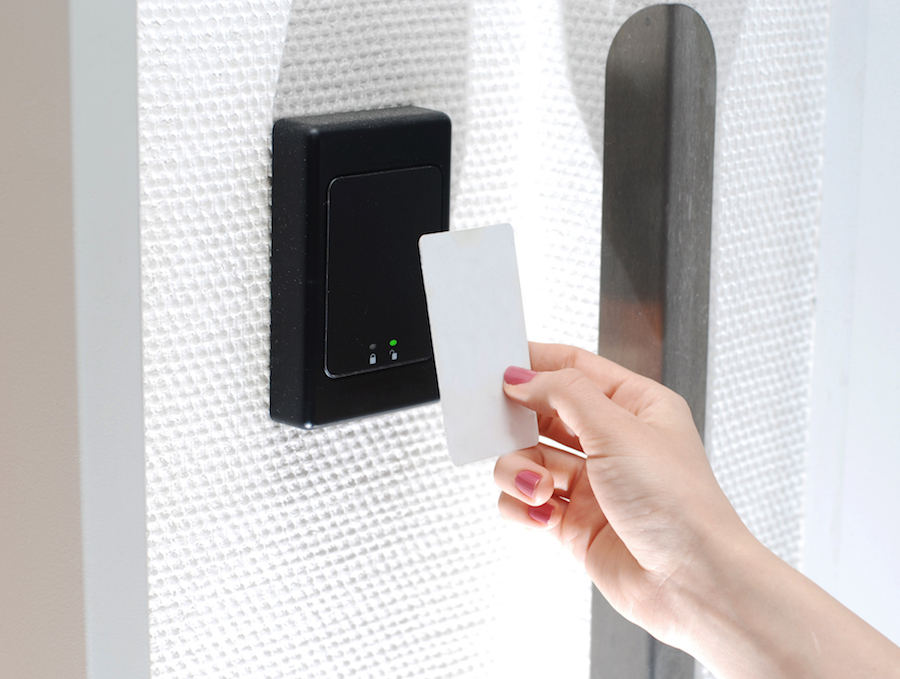How Access Control Solutions Can Help Curb the Spread
Touchless Entry and Contact Tracing Can Be Effective Tools to Avoid Community Spread

The challenges around fighting the spread of COVID-19 have been immense. Yet, in some areas, it has accelerated the adoption of technology solutions that have helped mitigate the problems. One example is the widespread use of video meetings and collaboration to enable people to work remotely. While not ideal in all situations, the success of that in many workplaces has caused some employers to rethink their workforce strategies, which could result in more future opportunities for work from home for many for whom it would be highly beneficial.
Other businesses and organizations have thought of contactless solutions to keep business going. Stores like Best Buy have heavily promoted online ordering with efficient store pickups, where just about all physical contact with personnel or the store is eliminated.
In a similar vein, many areas can be rethought for minimizing physical contact that doesn’t add value. Automatic doors eliminate pulls and touching handles, automatic flushing toilets, faucets, and soap and towel dispensing reduce physical contact in bathrooms, and other examples abound. And these things already exist; they do not require unproven new technology, but do require a willingness to replace existing infrastructure for long-term benefits.
Another technology that is proven and can provide rapid benefits is access control. Touchless access control for secure entry has existed for years. And with the advances in today’s software and integration with other intelligent security systems, it can also help in the fight against the spread of COVID-19 in the Rio Grande Valley and throughout Texas.
Keep reading to learn more.
SEE MORE: Touch-Free Access Control for Your Safety and Security
Touchless Entry
If you have keypads or other physical buttons and code-activated entry mechanisms, it may be time to rethink your access control. From a security perspective alone, codes can be used by anyone, even if individually issued. In contrast, an RFID touchless fob or electromagnetic cards are issued to individuals and can be traced for every use. Either of these approaches minimizes or eliminates physical contact.
Another solution for minimizing physical contact are motorized doors. Already required in many locations for ADA compliance, the combination of automated doors and touchless access control can provide a way to minimize hundreds or even thousands of points of physical contact via door handles, without constant sanitation. Automatic doors may aid in safety and security, too, by not being left ajar.
Tracking and Tracing
Access control systems can track entries by specific identities. Contact tracing has been identified as a critical tool around the world to identify with whom and where infected people have been, so anyone who has been exposed can be tested and properly treated as necessary. If an infected person has been identified, the access control system can trace all the locations that a person has been in. The system similarly knows all the other people who have been in that location and been possibly exposed.
In a large facility, the detailed level of identification can be vital to continued safe operations. Only people identified through actual data - the locations they’ve been – would need to be tested, rather than shutting down an entire operation by not having enough information.
Aside from access control, video surveillance is an adjunct technology that also helps with identification. For secure verification, advanced cameras with facial recognition can identify specific individuals at a location. The combination of touchless entry, access control, and video identification and tracking can all form a solution for a more secure and safe workplace, school, or facility.
ASAP Security Services offers integrated technology solutions for comprehensive security and safety, and our long history with complex systems uniquely qualifies us to bring new technology to bear to cope with the challenges of COVID-19. To learn more about these solutions, set up a consultation with our team by calling (877) 418-ASAP, filling out our contact form, or start a live chat with us below. We look forward to working with you!